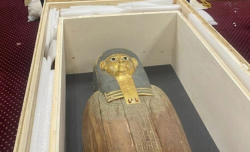Kafeel Khan: National threat or symbol of repression?
- 2020-09-03 16:32:05


 Pierre Rayer: Art, Science, and Happiness: The Universal Mission of Transmission to Future Generations through Patronage at the Louvre Abu Dhabi
Pierre Rayer: Art, Science, and Happiness: The Universal Mission of Transmission to Future Generations through Patronage at the Louvre Abu Dhabi Ahly crowned Super champions after dramatic extra-time win over Modern Future FC
Ahly crowned Super champions after dramatic extra-time win over Modern Future FC Yemeni Honey..A Development Wealth Threatened By Conflict And Climate Change
Yemeni Honey..A Development Wealth Threatened By Conflict And Climate Change California wildfires: Millions warned of possible power cut
California wildfires: Millions warned of possible power cut Central African rebels launch attacks near capital
Central African rebels launch attacks near capital Trump administration pauses immigration applications from nationals of 19 countries
Trump administration pauses immigration applications from nationals of 19 countries UK nursery worker pleads guilty to sexually assaulting children and filming abuse
UK nursery worker pleads guilty to sexually assaulting children and filming abuse Mubadala co-leads investment in South Korea's NanoH2O
Mubadala co-leads investment in South Korea's NanoH2O Egypt recovers intricate gilded coffin and key Middle Kingdom relic
Egypt recovers intricate gilded coffin and key Middle Kingdom relic Yemen’s Houthis release mariners held since July attack on ship Eternity C
Yemen’s Houthis release mariners held since July attack on ship Eternity C
